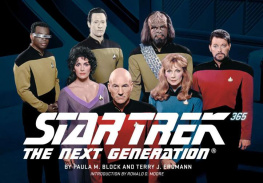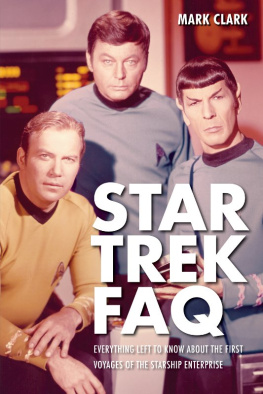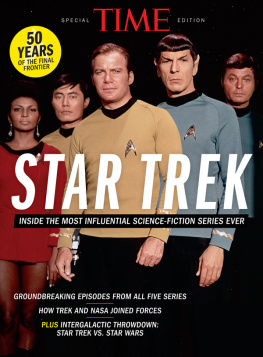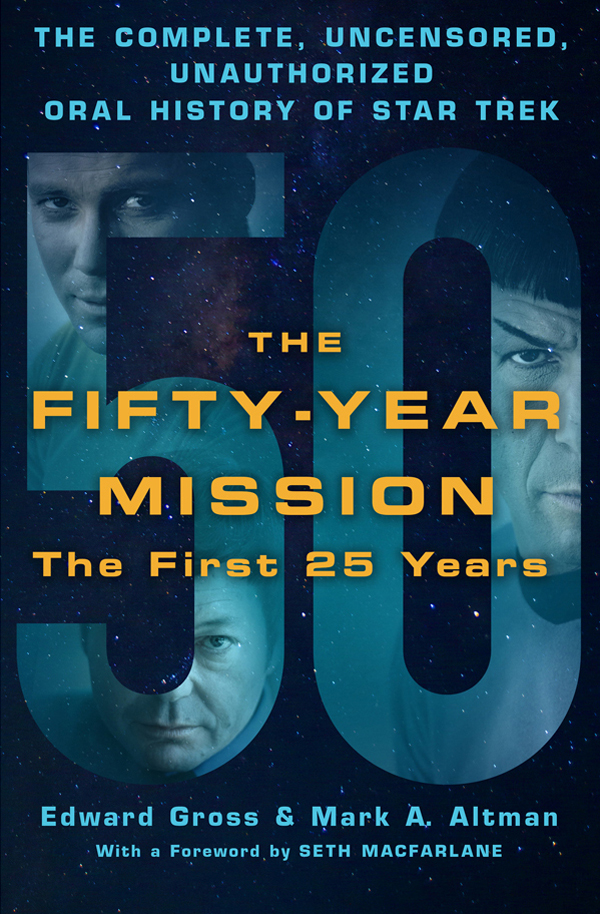Contents
Guide

The author and publisher have provided this e-book to you for your personal use only. You may not make this e-book publicly available in any way. Copyright infringement is against the law. If you believe the copy of this e-book you are reading infringes on the authors copyright, please notify the publisher at: us.macmillanusa.com/piracy.
FROM MARK A. ALTMAN
To my magnificent mom, Gail, for taking me to see Star Trek: The Motion Picture when shed rather have been anywhere else in the galaxy. At least you got to have The Mommies Marilyn Kentz play you in a movie.
To my unforgettable dad, Michael for everythingand even occasionally turning off the baseball, football, hockey, and basketball games to let me watch Star Trek.
To my sensational grandfather, Seymour, for stopping and taking me to a Star Trek convention in New Jersey when he really just wanted to get home to watch the Jets game.
To my brotastic brother, Ira, for caring about sports and not Star Trek so we never competed with each other, Decker.
To my wonderful wife, Naomi, for being the most enterprising woman I know.
And my amazing kids, Ella and Isaac, who helped me get over my aversion to children after watching And the Children Shall Lead. Its okay that you love the Ewoks really.
And, of course, Frederick S. Clarke; a mentor, a friend, and the man who made this book possible. You showed us all how its done. Remember.
Finally, Ed Gross. Thanks for being such a nudge. I would have never written this book with you if you hadnt kept bugging me for years about it. I cant imagine doing it with anyone else.
Also special thanks to our editor extraordinaire, Brendan Deneen, for being a Deep Space Nine fan, among many other things that make him awesome.
FROM EDWARD GROSS
To my wife and best friend, Eileen. Over thirty years on and were still boldly going! Theres no one Id rather be on this voyage with. Sorry this book turned you into a Star Trek widow.
To my sons, Teddy, Dennis, and Kevin. I am so proud of all three of you, and thrilled beyond words that we share a love for all things geek.
To my mom, dad, sister, and brother. Thanks for all the years of nodding and smiling politely no matter how strange my obsessions seemed.
To my father, who took me to the first Star Trek convention ever in 1972. Sorry we didnt connect on much, but that was one moment when we did.
To all of the editorsamong them Starlog s David McDonnell, Cinefantastique s Frederick S. Clarke, Cinescape s Douglas Perry, SFX s Dave Golder, Long Island Nightlife s Bill Ervolino, Movie Magic s Karen Williams, SciFiNow s Aaron Asadi, and Geek s David Williamswho saw something in me and my writing and helped keep the dream going for all of these years.
To my friends who have shared my love for Star Trek over the years, including John Garry, Kevin Oldham, Tom Sanders, Dexter Frank, Linda Miracco, Scott Milner, Jay Starr, Allen Lane, and Leon McKenzie.
To all of the people connected with Star Trek that Ive interviewed over the decades. So many of you made it easy to once again talk Trek for this book, and its genuinely appreciated.
To Laurie Fox and Brendan Deneen, respectively agent and editor extraordinaire, for believing in this project as much as we do.
And to Mark A. Altman. Throughout the process of writing this book, I could not imagine a better collaborator or cheerleader. It was such a joy to take this trip back to the Final Frontier with you.
Sam Cogley asked me to give you something special. Its not a first edition or anything, just a book. Sam says that makes it special, though.
Ariel Shaw, Star Trek episode Court Martial
Space may be the final frontier. But its made in a Hollywood basement.
Red Hot Chili Peppers, Californication
There are three sides to every story: your side, my side, and the truth. And no one is lying. Memories shared serve each differently.
Robert Evans, The Kid Stays in the Picture
BY Seth MacFarlane
Allow me to introduce myself. Im Ensign Rivers.
Even if youre a huge Star Trek fan, you may not know who that is. He was an assistant engineer on the first starship Enterprise , and although hes hardly the most memorable character Ive played, hes one Im very proud of. Its because he allowed me to be a small part of Star Trek , a franchise that has literally changed the world.
No, Im not exaggerating.
When Star Trek creator Gene Roddenberry sold that legendary pilot so many years ago, he was, of course, doing what lots of television writers do: He was creating a series in the hope of a steady paycheck. But that wasnt all he was doing. Because Gene was also a man of passion. He was angry about the suffering and injustice he saw in the world around him. And like other great television writers, such as Rod Serling and Norman Lear, Gene saw the medium as a powerful tool to comment on those injustices. To him, television was more than just a way to tell stories. He saw it as a platform to address things like politics, bigotry, religion, and sex. To him, such usage did not constitute preachiness. On the contrary, he felt it was his responsibility as a thoughtful writer to make a statement; to express a point of view, rather than simply to crank out filmed pablum with which to entertain the masses.
With Star Trek , Gene conceived a vision of the future that was unashamedly optimistic: effectively a blueprint for what humanity could become should it eventually succeed in evolving beyond its superstitious, xenophobic adolescence. The show celebrated and glorified the virtues of human ingenuity, scientific advancement, and moral progress. Its a vision that, to me, is sorely lacking in todays entertainment landscape. In our era of Hunger Games flavored dystopian science fiction, there is a conspicuous absence of such worthy models for the future. This should be cause for some concern. Carl Sagan once said, The visions we offer our children shape the future. It matters what those visions are. Often, they become self-fulfilling prophecies. Dreams are maps. I do not think it is irresponsible to portray even the direst futures. If we are to avoid them we must understand that they are possible. But where are the alternatives? The dreams to motivate and inspire? Indeed, when I watched Star Trek as a child, the moral guidelines it advocated were not lost on me. It meant something that those phasers were almost always set on stun, and that the crew never killed unless they had no other choice. Life was presented as precious. And while I loved the shoot-em-up action of Star Wars as much as the rest of my generation, its Star Trek I thank for the fact that, when I find a spider in my house, I am morally obliged to put it outside rather than dispose of it. All life is precious. Message received, Gene.
So there is no question that Star Trek makes a fine dream map. Its a world wed all like to live in. And Gene truly believed wed get there. He felt that the better, more civilized side of human nature was ultimately the stronger side, and would only grow more dominant as our species evolves. In that belief, he shares some philosophical ground with Martin Luther King, who said, The moral arc of the universe is long, but it bends toward justice. If this is true, and humanity naturally and inevitably evolves toward ethical maturity (as Michael Shermer powerfully and effectively argues in his book The Moral Arc ), then there can be no more ideal vision of the future in popular fiction than Star Trek .







